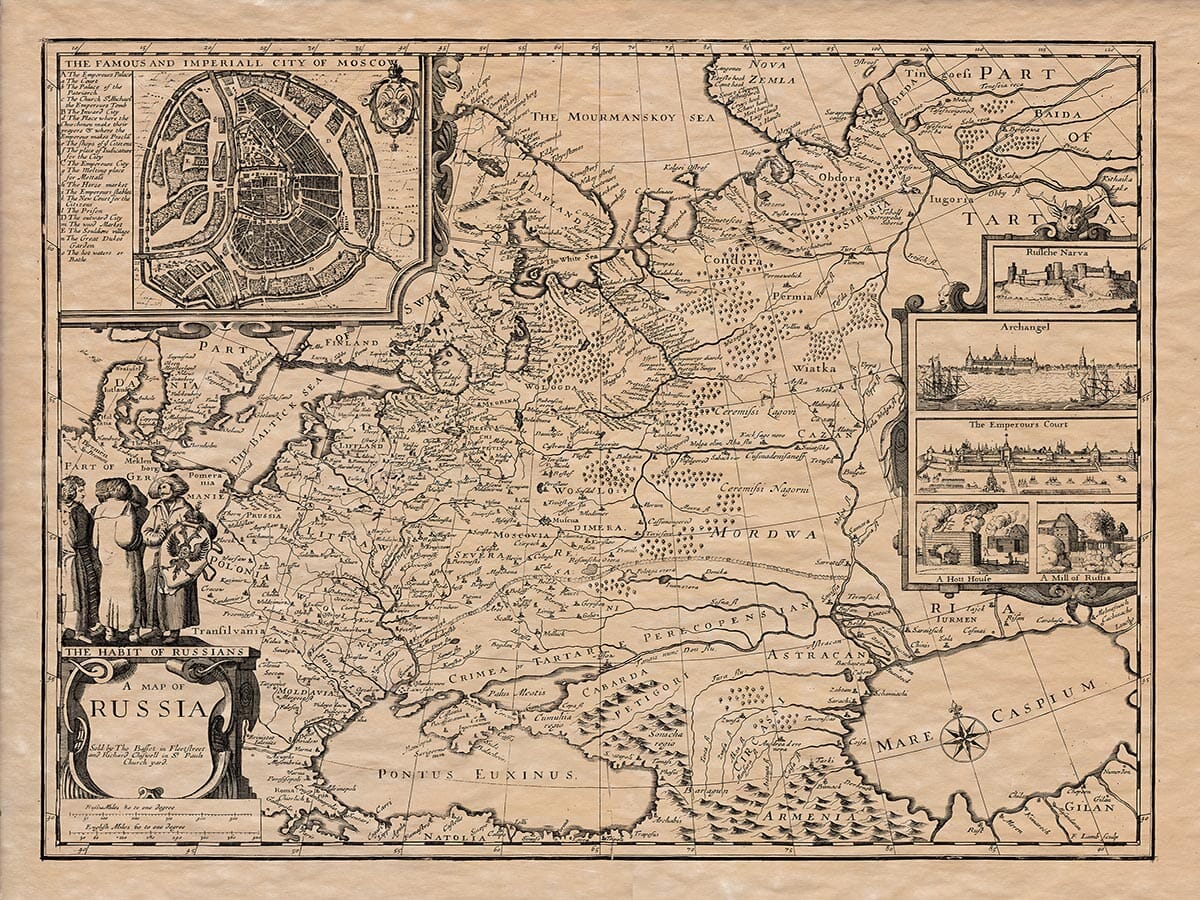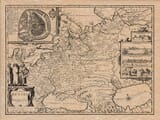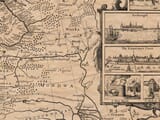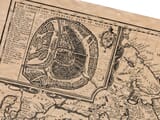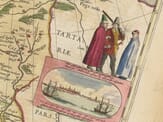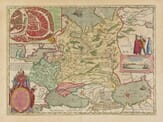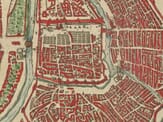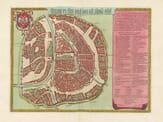Description
This Description of RUSSIA by John Speed appears on the verso of the old map.
Russia (surnamed Alba, to distinguish it from Russia Nigra, a Province of Poland,) otherwise called also Muscovia, from its chief Province, is the greatest, or rather only Empire of all Europe, and one of the greatest of the old and new world; extending from the 43d to the 66th degree of Northern latitude: the longest day in the most Southern parts being 16 hours and an half, and in the most Northern 22 hours and an half: the length in terrestrial measure is reckoned from the Promontory Liminin, vulgarly Cape Ob, to the Town Czeremche, 360 German miles; the breadth, from Cronslenburg, a Town in the Confines of Finland, to the River of Ob near Lapina, 300 German miles, each German mile being equivalent to four of ours; all under the Dominion of one Prince, the Czar, or Emperor of Russia, otherwise stiled the Great Duke of Muscovy. It is bounded on the North with the frozen Sea, on the East with Tartary, the South with part of Livonia; a Province now belonging to the Kingdom of Poland; and those Cremensian Tartars inhabiting the Southern Shores of Mare Caspiae and the Euxine, or Black Sea; on the West with certain Mountains, and the River Polne, which separates it from Livonia and Finland.
This large Country is judged to have been the principal habitation of the ancient Sarmatia, or Sarmatians, who besides what belongs at present to the Great Czar, are confined also within the limits of East Prussia, Lithuania, and that part of Moldavia between the Rivers Tyras and Hieras.
As to the temperature of the Air, it must needs be supposed, that in a Territory of so vast an extent, all parts cannot be alike, some being very distant from others. In Muscovy and the adjoyning Provinces the Air is so sharp and piercing cold, that sometimes no Furs are able to protect the noses and ears of those that venture forth into the Air; yet the earth being kept very warm with the snow, the first approach of Spring, which is also soon as in Germany, the face of Heaven puts on a pleasant and most serene aspect, and the earth a most lively verdure. In Winter they travel for the most part in Sledges, which being low, and covered over with Canvass, and the Passengers wrapt warm in Sheep-skins, they feel no cold, but are cast as it were into moving houses; and in Summer the heat is very near as intolerable as the cold in Winter.
Among their Plants there is one peculiar for which they call Baras, from its form or shape resembling a Lamb’s up-on a stalk, which seems to live as much in the manner of an Animal, it permits it changes places, and makes the grass wither as it runs about. This fruit is clothed with an hairy rind, which they say is dressed in stead of Fur: and Sealing writers note that no beast will feed on it but the Wolf: whom in turn, it is often set as bait. Their Melons, of which there is plenty, are commended as singularly well-tasted, and of an extraordinary large size.
The frequency of Wood and Forest furnishes this Country with store of wild Fowl, and all other kinds of beasts whose Furs are in highest price; besides one of a very peculiar kind, named by the people Viver, called also by the Poles and Latins Rascifer, and thought to be the same with the Tarandus of the ancients. Within the skin of this beast the same cloth themselves: it is in shape, and bigness, and horns, partly like a Stag, partly an Elk, but with long, rough, and shaggy hair: down towed, before their knees is iron-like ice, that it never slips: it is frequently made use of in the drawing of their Sledges upon any occasion of expedition; for it is reported to run 30 German leagues a day. Of Fish, none is here wanting but the Carp. Of Fowl, none but the Stork.
The Moscovites are strong and active of body, of a middle stature, but square-set, and brawny and of a natural ingenuity and subtility, which they make use of to cheat in their bargains and contracts, being false, treacherous, and perfidious: withal very lazy, and wholly unaddicted to Learning and Arts; only necessity obliges them to follow Husbandry: they are malicious, quarrelsome, and curious in company; yet their chiefest cōsolation abroad is to sit together in an Alehouse and manage with the like, first, or foot, which leaves many a murder the Sword or Gun would not commit. They are generally lascivious, and belly drinkers, both men and women, when occasion offers: at their great seasons and Festivals are so many drunken Bacchanals, in which they wallow one among another like Swine: at other times, if they are sober, it is not warmth they love above all things, in these living poor, for their ordinary drink is but a pitiful poor fort of tiss; and though the Country affords wherewith to fare delicately enough, yet the best of them scarce know how to feed elegantly, and the mean sort eat like what they are, poor slaves, and lodge as ill, that is, like the wild Irish, or barbarous Indians: the whole Family, man, woman, and brat, lie higgledy-piggledy altogether in a room, upon straw or mats, and in Summer-time upon benches or tables. And no wonder their manner of life is so animal and uncultivated, since they live (abominably) in most wretched slavery; the common People to the Nobles, the Nobles to the Czar: whose grand maxim it is, as generally in Monarchies tho’ very absolute, to proscribe Learning, well knowing that the necks of the ignorant most tamely submit themselves to the yoke of tyranny.
The Religion they profess is according to the Greek-Church, which they are said to have received from Constantinople, A.D. 987; though in the Muscovite Annals their first Conversion is boasted to have been from St. Andrew the Apostle: others say that Duke Vladimirus received Baptism in the year 987, upon his Marriage with Anna the Daughter of the Emperor Basilias: but the most received opinion is, that Leo coming out of Greece, and planting the Christian Faith among the Russians, became their first Patriarch, and fix’d his Seat at Kiow; whence, after some time, the Patriarchal Seat was removed to Volodimir, and lastly to Mosco, where it continues. The Patriarchs till about 100 years since, could not be confirmed but by the Patriarch of Constantinople; but hath ever since been chosen and confirmed only by the Czar, or Great Duke, though in the Consent of the generality of the Clergy, hath further confirmed him two Metropolitans, or Arch-Bishops, the Arch-Bishop of Novogrode, and the Arch-Bishop of Rostow: and under each of these there are 8 Bishops, enjoying very large Revenues, and are the largest contributors to the Great Duke, when he hath occasion to raise an Army.
Of the Rivers of this Country the chief are the Duina, or Borysthenes of the ancients, whose Fountain, though unknown to Herodotus, hath been since found to be near Duneberg, a Village of Muscovy, in the Wood Russe: the River Wolga, which flowing Southward by the Cities Smolensko and Kiow, after having taken in many lesser Rivers, dischargeth it self at last into the Euxin, or Black Sea. 2. Dneip, accounted to be the Tanais of Ptolemy, which springing out far from the Mountains of Borysthenes in the same Wood, and flowing by Riga, the Capital City of Livonia, falls at last into the Baltic Sea. 3. Volga, the Euba of Ptolemy, and now called Edel, which springing from a Lake of the same name, lies about 25 miles from Mosco, and flowing with a long course, and many windings after the taking in of many little streams, disburtheneth it self when it is less than 70 miles into the Caspian Sea, not far from the City Citrachan. 4. Don, or Tanais, by the Italians called Tana, which dividing Europe from Asia, hath its source, as some are of opinion, from the Rhiphae Mountains in a certain Wood, out of a vast Lake not far from the City Tula, and flowing with a long course between the Confines of Russia, Southward, makes the Maeotis, now called the Sea of Zaback, into which it empties it self.
The Russiam or Moscovian Empire is divided into 30 Provinces, whereof several are Duchies and Principalities, viz. 1. Musco, properly so called; the principal City whereof, and not only of this Province, but the whole Empire, is Musco, seated on a River of the same name, about five miles in compass, often burnt by the Tartars: it contains 16 Churches, but five the most part like the houses of mud and wood, the chief ornament of it is the Emperor’s Palace, like a Town for largeness: next is the Palace of the Patriarch. This City is defended by two Castles, Kitagorod and Belgorod: the next Town of note is Wladimir, &c. This Province extends from East to West 600 German miles.

Description of Russia by John Speed

